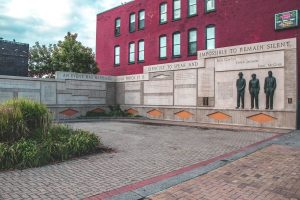
On June 12th of this year, Minnesota did something it hadn’t done in 162 years of statehood. It issued a posthumous pardon. The recipient was a man by the name of Max Mason. Mason was one of six Black men arrested for allegedly raping a White woman in Duluth, Minnesota exactly 100 years ago. Despite no evidence of wrongdoing, three of the men, Elias Clayton, Elmer Jackson, and Isaac McGhie, were dragged from their jail cell and hung on a downtown lamppost by an angry White mob. Mason came away with his life, but he was sentenced to 30 years in prison. He served nearly five before he was paroled and forced to leave the state.
Minnesota’s posthumous pardon of Max Mason is a belated effort to acknowledge the injustice he suffered. He was the victim of White supremacy and a criminal justice system that was broken then in many of same ways as it is today. Seventeen years ago, civic leaders in Duluth made a similar overture by erecting the Clayton Jackson McGhie memorial. The words of Edmund Burke, “An event has happened, upon which it is difficult to speak, and impossible to remain silent,” are prominently inscribed on its facade. It asks residents of this overwhelmingly white city to never forget the grotesque acts of racialized violence inflicted on its city’s streets. It asks all of us to speak out against systematic racism and all its horror.

I called Duluth home from 2005 to 2012 when I was on faculty at the University of Minnesota, Duluth. I visited the memorial on First Street between First and Second Avenues East on several occasions. My second to last semester there, I took a small group of students to the memorial as it was just down the hill from campus. Many of my students at UMD came from predominately White, middle-class suburbs surrounding the Twin Cities. They strained to imagine that a crime so horrid could happen in a city that today takes pride in its progressive attitudes and vibrant civic culture. This wasn’t the Duluth, this wasn’t the Minnesota, most of them knew.
Civil rights attorney Bryan Stevenson, a man whom I hope will serve on the U.S. Supreme Court one day, has long believed that the fight for racial equality and a more humane and equal justice system requires an America that’s willing to reckon with its violent past. “What’s important is that we acknowledge that we have not been honest about who we are, and about how we came to this moment,” Stevenson said recently.In the days since George Floyd’s death, and as protests ignited in Minneapolis and cities beyond, I’ve thought again about the Clayton Jackson McGhie memorial. In Duluth’s tragic episode we can find intertwined cogs in America’s ever-evolving system of racial oppression. The racialized control of the Jim Crow era gave way, by the 1980s, to an ever larger and more punitive penal system that, in both its design and effect, served much the same purpose.
There wasn’t then, nor is there now, a geographic monopoly on racial oppression and violence. Although ideologically progressive Minnesota has historically produced one of the lowest overall rates of incarceration, it has one of the highest Black/White incarceration disparity rates in the country. Blacks are more than 11 times more likely to be imprisoned than whites. Blacks experience worse outcomes and more punishment at every major entry or decision point in the state’s criminal justice system.
One of the first things I noticed when moving to Minnesota was how longtime residents tended to contextualize the state in political discourse. There was “the cities,” meaning Minneapolis and St. Paul, and then there was everything else in “Greater Minnesota.” I quickly learned how the center of political gravity revolved around what happens in the cities. And so it is with criminal justice. So many of the racial inequalities in the state’s justice system are shaped by the actions by the Minneapolis Police Department and prosecutors in densely populated Hennepin County which alone accounts for 14% of the state’s Black population. According to a report of Minneapolis policing by the American Civil Liberties Union, Black people are almost 9 times more likely than Whites to be arrested for low-level offenses like trespassing, disorderly conduct, or lack of proof of car insurance. These are almost universally “crimes of poverty.” Each year, they serve as a gateway to the criminal justice system for thousands of Black men and women, further eroding trust between police and communities of color. For many of my former students in Minnesota, and indeed, for many White people like me who grew up or live in mostly White suburban neighborhoods, the criminal justice system carries a light footprint. From here, it’s all too easy to ignore the harm and injustice the criminal justice system unleashes on communities of color. For decades, middle- and upper-class Whites have voted for tough-on-crime prosecutors, judges, and politicians. They applauded as our police were tasked with managing social ills they should never have been asked to manage. We then conveniently (and sometimes quite literally) walled ourselves off from the moral burden of having to observe the system’s negative externalities—the state-sponsored violence inflicted on Black men like George Floyd. School segregation, restrictive housing covenants, the construction of massive freeway systems, and prisons built in distant lands: all these made feigned White-ignorance possible among the suburban masses.Minnesota’s posthumous pardon of Max Mason obviously can’t undo the harms he suffered. It also can’t undo the harms on the living. For those have already filtered and compounded in Black and Brown communities in innumerable ways over time. But it does offer me hope that we can and will do better. It’s a small acknowledgement of our mistakes past and a renewed commitment to understand how they shape our present. It offers me hope to see Whites’ attitudes warming to the Black Lives Matter movement. It offers me hope to see Whites, especially White Democrats, now expressing the belief that the criminal justice system is biased against African Americans and other racial and ethnic minorities. It offers me hope to see people of every race and ethnicity protesting and organizing in front of the Minneapolis City Council and county commissions across the land—places where real change can still occur in our politically polarized age. It offers me hope to see Minnesotans leading the way.
San Jose, CA
June 22, 2020
Previous Reflection Next Reflection
Return to the Wonderful/Wretched Series introduction.
